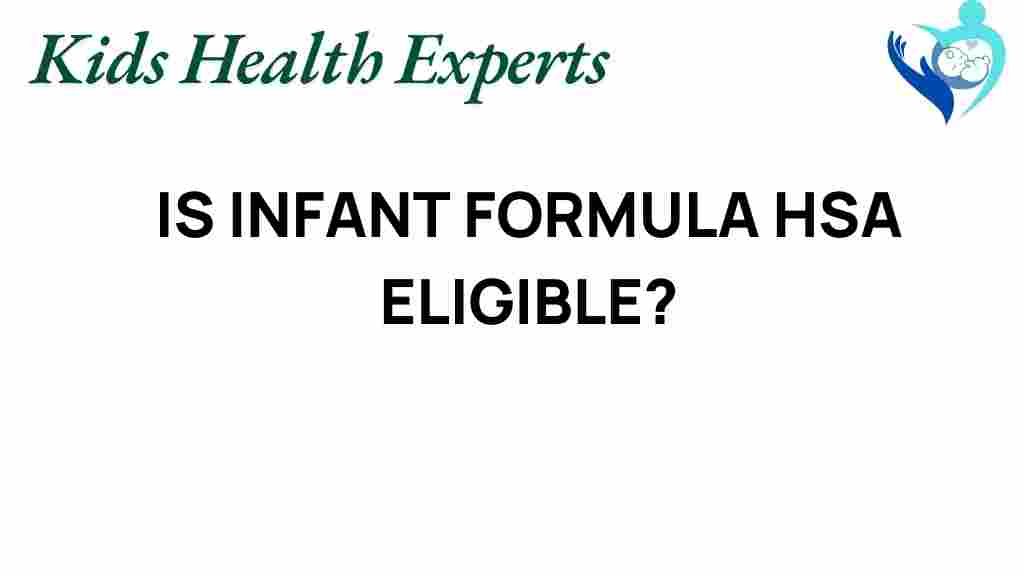Is Infant Formula HSA Eligible? Unpacking the Controversy
As new parents navigate the complexities of baby nutrition, questions often arise about the costs associated with feeding their little ones. One common query is whether infant formula is HSA eligible. This topic has generated a lot of discussion among families looking to make the most of their budget and maximize the benefits of their healthcare savings account. In this article, we will explore the intricacies of HSA eligibility regarding infant formula, understand the associated tax benefits, and provide practical tips for effective family budgeting and financial planning.
Understanding HSA Eligibility
Health Savings Accounts (HSAs) are tax-advantaged accounts that allow individuals to save for medical expenses. To use HSA funds, the expenses must be considered “qualified medical expenses” as defined by the IRS. This raises the question: Is infant formula included in this list?
What Are HSAs?
Health Savings Accounts are designed to help individuals save money for healthcare expenses. Here are some key features:
- Tax Benefits: Contributions are made pre-tax, reducing taxable income.
- Tax-Free Withdrawals: Funds can be withdrawn tax-free when used for qualified medical expenses.
- Rollover Benefits: Unused funds roll over year to year, allowing for long-term savings.
Infant Formula and HSA Eligibility
When it comes to infant formula, the IRS has specific guidelines. Generally, HSA eligible expenses must be for the diagnosis, cure, mitigation, treatment, or prevention of disease. Infant formula is not specifically listed as a qualified medical expense, which leads to confusion among parents. However, there are some nuances to consider.
Criteria for HSA Eligibility
To determine if infant formula can be purchased with HSA funds, it’s essential to consider the following:
- Medical Necessity: If a doctor prescribes infant formula for a specific medical condition (e.g., lactose intolerance), it may be considered HSA eligible.
- Documentation: Always keep receipts and any relevant documentation from your healthcare provider to substantiate the purchase.
Examples of Eligible Infant Formula Purchases
Here are scenarios where infant formula may be deemed HSA eligible:
- Infant formula prescribed for a baby with a medical condition.
- Specialty formulas (e.g., hypoallergenic) recommended by a pediatrician.
Tax Benefits of Using HSA for Baby Nutrition
Using HSA funds for eligible infant formula can lead to significant tax savings. Here’s how:
- Reduced Taxable Income: Contributions to your HSA lower your taxable income, which can increase your overall tax refund.
- Tax-Free Withdrawals: Withdrawals for qualified medical expenses, including potentially eligible infant formula, do not incur taxes.
Family Budgeting and Financial Planning
Managing family finances is crucial, especially when preparing for a new baby. Here are some tips for budgeting effectively while considering infant formula expenses:
- Create a Budget: Start by listing all baby-related expenses, including infant formula, diapers, and doctor visits.
- Track Your Spending: Keep meticulous records of all health-related expenses to identify areas for savings.
- Utilize Your HSA: If eligible, use your HSA to cover medical expenses, including any qualifying infant formula.
Common Budgeting Mistakes to Avoid
When budgeting for a new baby, be wary of these common pitfalls:
- Neglecting to Plan for Unexpected Costs: Always set aside a buffer for unforeseen medical expenses.
- Underestimating Routine Expenses: Infant formula and baby supplies can add up quickly; ensure your budget reflects real costs.
Step-by-Step Guide to Using HSA for Infant Formula
If you believe your infant formula purchase may qualify for HSA reimbursement, follow these steps:
- Consult Your Pediatrician: Discuss your baby’s nutritional needs to determine if a specific formula is necessary.
- Get Documentation: Obtain a prescription or letter of medical necessity from your doctor.
- Purchase the Formula: Buy the eligible infant formula and keep the receipt.
- Document Everything: Maintain records of your purchase and the medical documentation.
- Submit for Reimbursement: If you didn’t use your HSA card at the point of purchase, submit your claim for reimbursement.
Troubleshooting Tips
If you encounter issues while trying to use HSA funds for infant formula, consider the following troubleshooting tips:
- Check with Your HSA Provider: They can clarify what qualifies as an eligible expense.
- Review IRS Guidelines: Familiarize yourself with IRS Publication 502, which outlines qualified medical expenses.
- Contact a Tax Professional: For personalized advice regarding your situation, consulting a tax expert can be beneficial.
Conclusion
In conclusion, the question of whether infant formula is HSA eligible is nuanced and often depends on specific circumstances. While standard infant formula may not qualify, there are scenarios where it can, particularly when prescribed for medical reasons. Understanding HSA eligibility and leveraging tax benefits can significantly aid in family budgeting and financial planning during this crucial time in your life.
For more information on how to maximize your HSA and ensure you’re making the best financial decisions for your family, consider visiting the IRS website for the latest updates on qualified medical expenses. Remember, effective financial management during your baby’s early years can set the foundation for a secure future.
Explore our additional resources on family budgeting and HSA strategies to make informed decisions for your family’s health and financial well-being.
This article is in the category Nutrition and created by KidsHealthExperts Team
